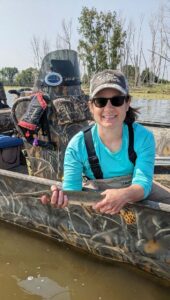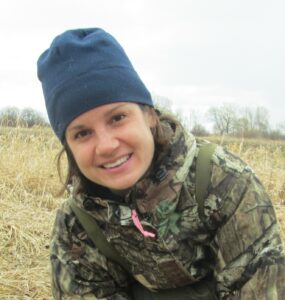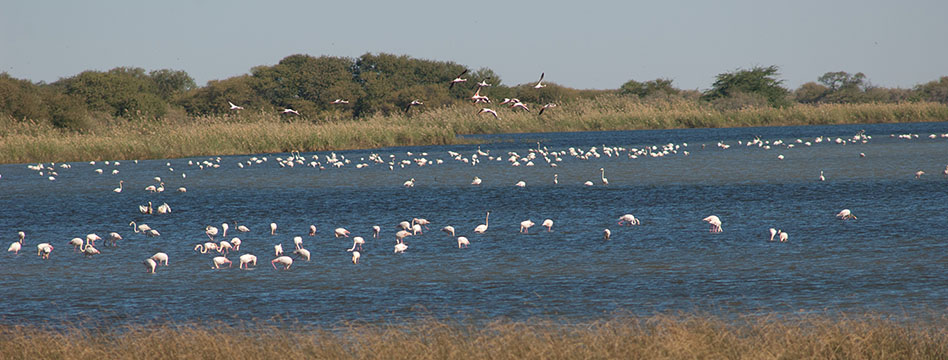Amy Carrozzino-Lyon is a restoration scientist, project coordinator and faculty member in the Master of Science in Biodiversity Conservation and Management. Based in the Green Bay area, she regularly spends her time in the field while teaching courses in the program.
Students in Biodiversity Conservation and Management can choose to pursue one or more of the three available stackable certificates, complete a foundational certificate, or complete all of the certificates plus a capstone to earn a graduate degree.
Amy recently sat down and talked with us about her background and what she’s looking forward to in the program, which launched in fall 2023.
 What is your background?
What is your background?
My educational background is in wildlife and fisheries science. I went to undergrad for that subject area [B.S. Wildlife and Fisheries Sciences, Penn State, M.S. & Ph.D. Fish and Wildlife Conservation, Virginia Tech]. I was involved in field work and conservation right away. I always knew that’s what I wanted to study.
As a child, I was always interested in going to nature centers and attending programs and learning about whatever–anything and everything that had to do with the outdoors.
And when I was studying fisheries and wildlife, I was pretty confident that’s the field I wanted to be in. I love doing field work. And when I went to graduate school, I had the opportunity to learn a little bit more about human dimensions of fisheries and wildlife. So I was able to add some social science work to my environmental science background, and that was really a good fit for me.
It’s not something that everybody in the field has experience with because, of course, if you are interested in fish and wildlife, you want to be outdoors, and oftentimes, like off in the woods with animals and not with people.
And so the concept of understanding people’s thoughts and opinions and attitudes toward nature is sometimes a little foreign to people, but it was something I found really interesting, and I found that it was a good fit to have both experiences, the social science side of things along with an environmental science background.
How have you been able to apply your education and background to the work you’re currently doing?
There are a lot of questions that come up in conservation today that have to do with both of those components, and it’s a really good experience for me to have a background in both so that I can combine those and the work that I’m doing today. Everything from outreach with K-to-12 groups. We have schools that participate in restoration activities related to wetlands in the Green Bay area, something I’m heavily involved in right now, which I probably wouldn’t have sought out the opportunity if I didn’t have a little bit of background in working with people.
So I think it’s an important component that most people in conservation and biodiversity will really value even if they don’t immediately see that that’s the direction they’d like to go. I think they’re going to end up working with people in some capacity, and so that experience really does–it does matter and it makes a difference in your career for sure.
So I think the path that I took largely was influenced by that experience that I had in school. And then in the choices that I’m making today for projects that are working well for me and continuing to learn throughout because I think that’s important, too, in our field.
What’s a typical ‘day in the life’ for you?
A lot of our field work with wetlands takes place in the summer, of course, so that season looks a little bit different. I do some fall field work, so we do have quite a few field trips. And some of our restoration work particularly with wild rice takes place in the fall. So we have a shorter fall field season that keeps us really busy like [in] October.
Typical day is going to vary, but a lot of days in the summer are in the field. Sometimes I’ve taken meetings from the boat on the Bay of Green Bay before. I don’t try to do that, but sometimes it happens that way. If there’s something important I need to check in with conservation partners. I haven’t taught a BCM (Biodiversity Conservation and Management) course yet in the summer, so I’m interested to see how that works this summer as far as engaging with the class and being in the field. But maybe there’s some additional opportunities to share some of the things I’m doing, too, with the class, so that could be a pro in addition to a challenge.
I work with conservation partners like state and federal agencies; I work with Ducks Unlimited a lot, so nonprofit organizations that do conservation work. I think working with those partners is almost probably one of the more valuable parts of my day-to-day life because that really has an influence on the projects that we do. It has an influence on the outreach that we do related to those restoration projects. We seek funding together to be able to get projects off the ground.
I also meet with elected officials sometimes to share some of our work, how things are going and explain our needs. I show off the Bay of Green Bay, particularly with the National Estuarine Research Reserve coming down the road. That’s something we do a lot in field tours–just take people out to the places where we work and show off the work we’re doing and talk about next steps, future plans, where things are going, how things are improving, etc.
The part that I like the most about working in this field is that there aren’t many days that are the same, even in what we would call, quote unquote, “the off-season,” which is right now. You think, oh, I’d be in front of the computer all the time writing reports, and I always tell myself, oh, I’m going to catch up on all those things that I didn’t get to do last summer because I was too busy and not at my computer, and it never happens.
Because it’s a lot of planning getting ready for next year, like hiring students to work on the field crew. There is obviously some reporting and things like that to do, but it goes by fast. And I think working with conservation partners is something that I really value, and it’s probably one of the more important parts of my job right now. And I think that has a lot of crossover, too, with many of our BCM courses. I’m currently teaching in the Leadership, Policy, and Management certificate area courses, and the courses have that component as part of them. My experience is lending itself well to being prepared to teach those courses and be able to share personal experiences with the students.
 What do you love about teaching?
What do you love about teaching?
I think one thing that’s been particularly great about working with students is the diverse backgrounds that they come from. Everybody’s story is different as to how they got into conservation. And particularly with graduate students, many people have worked in the field previously or maybe they came from a different subject area. They went to school for psychology or something and then they had a personal experience that led them to conservation. When they come to graduate school, they’re particularly motivated and excited to learn about conservation, but they also bring that life experience that they’ve already had, maybe in a different subject area, to the conversation and to the class. I think that’s a huge benefit as far as where people are coming from and what they can offer.
And I think that’s an added value, too, with the online program because people are coming from all over. We have a student in California, and she could share some of the work that she was doing as an employee in conservation in California with species that we don’t have here and problems that are different than the ones that we face in the Great Lakes region. So I think that’s a huge value.
I especially like working with students because many of them are extremely motivated to learn and excited to be part of the program. And I’m happy to use my experience as an example to be able to lead them to where they want to be in conservation, wherever [and] whatever that entails because it’s different for everybody.
But there are a lot of opportunities and it’s pretty cool to be able to work alongside students as they move forward with their program and hopefully achieve the goals that they want to as far as future employment or career advancements.
Biodiversity and Conservation Management is such a new program, which is very exciting. What are you looking forward to the most as it evolves?
The program’s growth has been really inspiring. A lot of students are finding us, which is awesome. And I’m excited to see that continue. I’m also particularly excited for our first cohort of students to get to their capstone projects as part of the master’s degree. They’re going to be completing a capstone. And I think the creativity that I see in some of the course assignments is going to be reflected in the capstone. I’m excited to see what students come up with and what kind of impact they’re going to have through their capstone projects wherever they live.
You mention enjoying the fact your students have diverse backgrounds. What are some of their backgrounds?
I would say it varies quite a bit. There are quite a few students who are coming right out of undergrad who are pursuing a graduate program, and for personal reasons, it’s better for them to do that online, whether they’re working already or they have family commitments or other things.
There are a lot of returning students who are coming back maybe from a conservation job where they wanted to have some career advancement. Maybe they need some additional credentials to get a promotion at their job or they are hoping to switch fields from maybe more of a general biology background to a little bit more of a biodiversity and conservation experience. So it varies a lot.
Learn more about our 100% online degree and certificate programs.![]()
Get Program Guide
Do you need a science background to succeed in this program?
You don’t have to have a hard science background, and you don’t have to have a conservation background either. A lot of times, students who come from other fields bring some pretty valuable experience to conservation.
I think some students might view [not having a science background] as a barrier at first. Some who have contacted me say, “I’m not sure how I’m going to do in the courses because I just don’t have a background in this subject area and I’m concerned that I don’t have the right experience to lend myself well to this program.”
However, I really don’t think that’s a limitation at all. If you come from any field, you’re going to have experiences that are going to relate to conservation in some way. Psychology, economics, marketing. One person mentioned they have a marketing communications degree, but they’re particularly interested in conservation. So they can bring skills that a lot of us don’t have to the field. There’s a lot of opportunity.
Could you speak to what it’s like being a female in your field?
Particularly as an undergrad student, I would say females were the minority. But a lot of programs, in the case of my alma mater, actually are now switching to more female representation in these conservation degrees.
Why is that? I don’t know. Maybe it’s just that the door opened and people feel comfortable pursuing that education now that it’s becoming more common. I think maybe, too, perhaps women see the diversity of opportunity in conservation. A lot of people originally pursued that type of degree because they were going to be a forester or a forest ranger or some of the more traditional jobs that were available in conservation. That has diversified immensely just in my time in the field [20 years] as well.
I would say, nowadays it’s quite common to see either pretty equal representation or, in fact, in some cases, perhaps more female representation than male in some cases.
Were there any females throughout your educational experience or career experience that were a mentor or inspiration to you?
That’s a great question. And I’ve actually thought about that before because I’ve participated in some programming for girls to introduce them to STEM. And I actually don’t think I have had any female mentors in the field. Certainly family members and other people in my life who are inspiring, but not so many mentors who are female in conservation.
I had mostly male mentors who saw the value of equality and diversity in conservation and who encouraged me to continue to follow the goals that I had and to keep going when things got challenging to pursue research as a graduate student and make sure that I was speaking up for myself when I needed to.
I think having supportive men around you a lot of the time can also be particularly motivating, especially those that really recognize and want to champion women in conservation as well. Sure, you’re going to face challenges at times, but I definitely felt like I had enough people in my corner. And even classmates and colleagues I had a lot of support from as well. I’ve never felt singled out. In the past I had been in meetings where I would realize that I’m the only woman in the room right now. But other than that, I’ve really felt very welcomed in the field, and I don’t feel that it’s been a barrier for me personally.
Is there anything else you want to mention?
I’m excited to see where we go from here. I would just really stress or encourage people who might be thinking about the program to think outside the box and not be limited if they are coming from another field. Or, if they’re interested in conservation as a second career or new career opportunity.
I think it’s a great opportunity to pursue some of the options that we have, particularly with the certificates, so that people can advance their credentials without getting a master’s degree.
Are you interested in making a difference? When you enroll in the Biodiversity Conservation and Management program, you can choose your own learning path by completing individual certificates, or three stackable credentials plus a capstone project to earn the master’s degree. As a graduate of the master’s degree program, you’ll be qualified to pursue leadership and management roles within nonprofit and government conservation organizations and other agencies within the biodiversity conservation field.
Contact an enrollment adviser today to learn more about which path is right for you.









